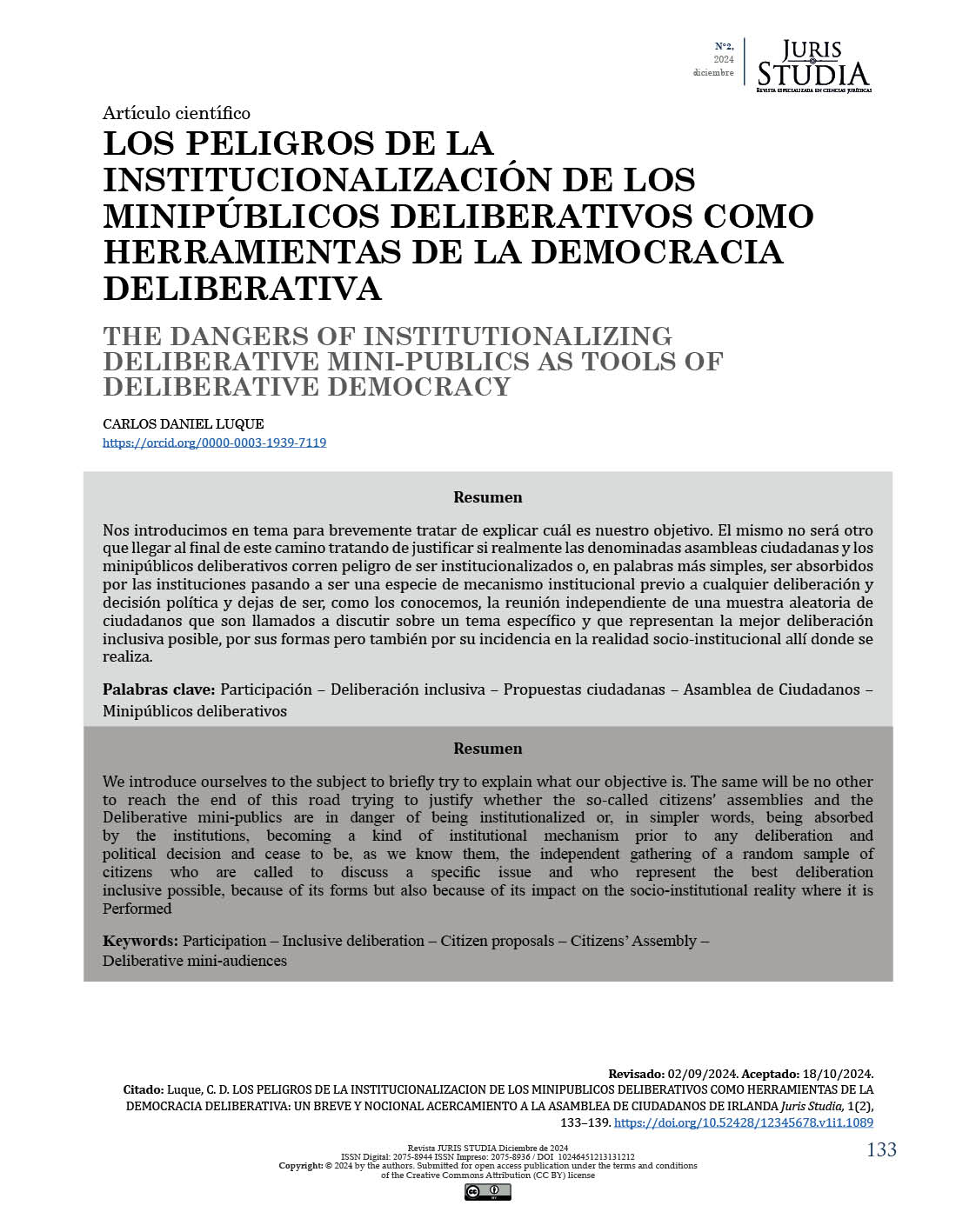THE DANGERS OF INSTITUTIONALIZING DELIBERATIVE MINI-PUBLICS AS TOOLS OF DELIBERATIVE DEMOCRACY
UN BREVE Y NOCIONAL ACERCAMIENTO A LA ASAMBLEA DE CIUDADANOS DE IRLANDA
DOI:
https://doi.org/10.52428/30074320.v1i2.1132Keywords:
Participatory DemocracyAbstract
We introduce the topic to briefly explain our objective. This will be none other than to reach the end of this journey while trying to justify whether the so-called citizen assemblies and deliberative mini-publics are in danger of being institutionalized or, in simpler terms, being absorbed by institutions, turning into a sort of institutional mechanism prior to any deliberation and political decision. They cease to be, as we know them, the independent gathering of a random sample of citizens called to discuss a specific topic, representing the best possible inclusive deliberation, both in form and in their impact on the socio-institutional reality where they take place.
To reach that point, we have, methodologically, a roadmap that many will surely notice, and we will try to mention it here as briefly as possible. We begin by discussing the reality of the significant weakening of traditional voting in political representation, then we address the "electoral extortions" that we can see, for example, in the so-called "exit plebiscites"; these topics will lead us, by decantation, to present and discuss the visualization, or not, of deliberative mini-publics as a very powerful tool to enhance the existing and current tools of citizen participation and representation.
Our work will ultimately focus on the citizen assemblies that took place during the second decade of this 21st century in Ireland on issues of great social, legal, and constitutional importance such as marriage equality, abortion, gender equality, and the environment. We will seek to conclude, after developing the established itinerary, that citizen assemblies should be the direct transmission of public opinions to the political class and not, as we outlined at the beginning, just another tool of the existing institutional framework.
References
Aristóteles. 1988. Política. Madrid: Gredos.
Camarelles, Gabriel. 2021. El sorteo como herramienta de innovación democrática: el potencial de los minipúblicos deliberativos. Revista Española de Ciencia Política, 56.
https://doi.org/10.21308/recp.56.06 DOI: https://doi.org/10.21308/recp.56.06
Fishkin, James S. 2009. When the People Speak, Deliberation Democracy and Public Consultation. Oxford: Oxford University Press.
Gargarella, Roberto, 2021. El derecho como una conversación entre iguales. Siglo XXI Editores.
-2021. La batalla interpretativa del voto. Diario Clarín, Opinión. Buenos Aires, Argentina.
Lafont, Cristina. 2015. Deliberation, Participation, and Democratic Legitimacy: Should Deliberative Mini-publics Shape Public Policy?. The Journal of Political Philosophy, 23. Disponible en: https://doi.org/10.1111/jopp.12031.
https://doi.org/10.1111/jopp.12031 DOI: https://doi.org/10.1111/jopp.12031
Manin, Bernard. 1998. Los principios del gobierno representativo. Madrid: Alianza Editorial.
Pitkin, Hanna. 1985. El concepto de representación. Madrid: Centro de Estudios Políticos y Constitucionales.
Quill, Ursula. 2023. 'Ireland's Citizens' Assembly on Biodiversity Loss: Potential and Limitations for Deliberative Democracy'. ConstitutionNet, International IDEA, 31.
Tormey, Simon. 2015. Democracy will never be the same again: 21st Century Protest and the Transformation of Politics. Recerca. Revista de Pensament i análisis, 17. Disponible en: http://dx.doi.org/10.6035/Recerca.2015.17.6.
https://doi.org/10.6035/Recerca.2015.17.6 DOI: https://doi.org/10.6035/Recerca.2015.17.6

Downloads
Published
How to Cite
Issue
Section
License
Copyright (c) 2024 Carlos Daniel Luque

This work is licensed under a Creative Commons Attribution 4.0 International License.
Authors who publish with this journal agree to the following terms:
- Authors retain copyright and grant the journal right of first publication with the work simultaneously licensed under a Creative Commons Attribution License 4.0 that allows others to share the work with an acknowledgement of the work's authorship and initial publication in this journal.
- Authors are able to enter into separate, additional contractual arrangements for the non-exclusive distribution of the journal's published version of the work (e.g., post it to an institutional repository or publish it in a book), with an acknowledgement of its initial publication in this journal.
- Authors are permitted and encouraged to post their work online (e.g., in institutional repositories or on their website) prior to and during the submission process, as it can lead to productive exchanges, as well as earlier and greater citation of published work.










